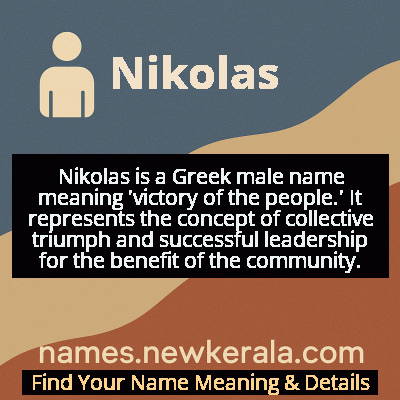Nikolas Name Meaning & Details
Origin, Popularity, Numerology Analysis & Name Meaning of Nikolas
Discover the origin, meaning, and cultural significance of the name NIKOLAS. Delve into its historical roots and explore the lasting impact it has had on communities and traditions.
Name
Nikolas
Gender
Male
Origin
Greek
Lucky Number
9
Meaning of the Name - Nikolas
Nikolas is a Greek male name meaning 'victory of the people.' It represents the concept of collective triumph and successful leadership for the benefit of the community.
Nikolas - Complete Numerology Analysis
Your Numerology Number
Based on Pythagorean Numerology System
Ruling Planet
Mars
Positive Nature
Generous, passionate, energetic, and humanitarian.
Negative Traits
Impulsive, impatient, moody, and can be overly emotional.
Lucky Colours
Red, maroon, scarlet.
Lucky Days
Tuesday.
Lucky Stones
Red coral, garnet.
Harmony Numbers
1, 2, 3, 6.
Best Suited Professions
Military, sports, philanthropy, leadership roles.
What People Like About You
Courage, energy, leadership, generosity.
Famous People Named Nikolas
Nikolas Tesla
Inventor and Electrical Engineer
Pioneered alternating current electrical systems and made groundbreaking contributions to electromagnetism
Nikolas Asimos
Singer and Composer
Influential Greek folk singer known for his unique musical style and poetic lyrics
Nikolas Kaklamanakis
Olympic Windsurfer
Gold medalist at the 1996 Atlanta Olympics and silver medalist at the 2004 Athens Olympics
Nikolas Papanikolaou
Water Polo Player
Captain of the Greek national water polo team and Olympic medalist
Name Variations & International Equivalents
Click on blue names to explore their detailed meanings. Gray names with will be available soon.
Cultural & Historical Significance
Extended Personality Analysis
Individuals named Nikolas are often perceived as natural leaders with strong charismatic qualities and a genuine concern for community welfare. They typically exhibit confidence, determination, and strategic thinking—traits that align with the name's meaning of 'victory of the people.' Many Nikolases demonstrate excellent problem-solving abilities and tend to approach challenges with methodical planning rather than impulsive reactions. Their leadership style often combines authority with empathy, making them effective in positions where they can guide and inspire others. Socially, Nikolases are usually outgoing and build strong networks of relationships, though they may maintain a certain reserve in personal matters. They often possess strong moral convictions and a sense of responsibility toward those in their care, whether family, friends, or professional teams. While ambitious and driven to succeed, they typically balance personal achievement with consideration for collective well-being, reflecting the name's emphasis on communal victory rather than individual triumph alone. This combination of strength and compassion makes Nikolases particularly effective in roles that require both decisive action and emotional intelligence, from business leadership to community organizing and creative endeavors.
Modern Usage & Popularity
In contemporary usage, Nikolas maintains steady popularity as a strong, classic name with international appeal. While particularly common in Greece and Greek diaspora communities, it has gained traction globally as parents seek names that are traditional yet distinctive from the more common 'Nicholas.' The spelling 'Nikolas' has seen increased usage in English-speaking countries as parents look for ways to honor Greek heritage or simply prefer the phonetic spelling. In the United States, the name has consistently ranked within the top 500 male names for decades, with particular popularity among families of Mediterranean and Eastern European descent. Modern trends show that Nikolas appeals to parents who want a name that sounds sophisticated and internationally versatile while retaining its powerful historical meaning. The name's adaptability across cultures and its association with intelligence and leadership continue to make it a compelling choice for newborns worldwide. Recent decades have seen the name maintain its classic appeal while avoiding becoming overly trendy or dated, positioning it as a timeless option that works equally well in professional, academic, and social contexts across different cultures and languages.
Symbolic & Spiritual Meanings
Symbolically, Nikolas represents the triumph of collective effort over individual ambition, embodying the ideal of leadership that serves the greater good. The name carries connotations of protection, guidance, and benevolent authority—qualities associated with its most famous bearer, Saint Nicholas, the protector of children and sailors. In metaphorical terms, Nikolas symbolizes the bridge between traditional values and modern achievement, representing someone who honors heritage while pursuing contemporary success. The name also suggests resilience and strategic thinking, as victory (nike) implies overcoming challenges through planning and perseverance rather than brute force. In psychological symbolism, Nikolas represents the integration of personal strength with social responsibility, suggesting an individual who finds fulfillment in contributing to community welfare. The name's enduring popularity across centuries and cultures speaks to its powerful symbolic resonance with universal human aspirations for meaningful leadership and lasting impact. This symbolic richness makes Nikolas not just a personal identifier but a representation of ideals that transcend individual identity, connecting the bearer to broader cultural narratives about success, responsibility, and human connection.

